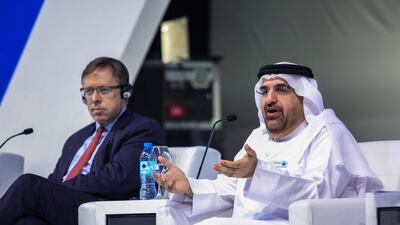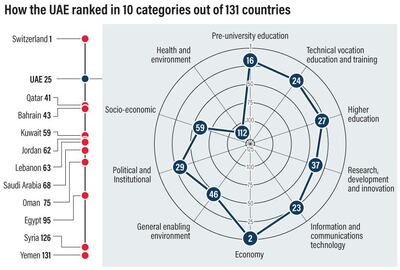The UAE ranks second in the world, just behind Singapore, in terms of economic nous, according to the first Global Knowledge Index released on Wednesday.
Despite this impressive ranking, more work needs to be done in innovation, research and development, according to the index launched at the Knowledge Summit in Dubai.
The index, compiled by the Knowledge Project, identifies knowledge as an integral part of human life - affecting social, economic and cultural aspects - and an engine for sustainable human development.
Overall, the UAE is ranked 25th out of 131 countries, and first in the Middle East.
The project is a collaboration between the Mohammed bin Rashid Al Maktoum Knowledge Foundation, the United Nations Development Programme (UNDP), and experts from the International Telecommunication Union, the World Bank, the University of Maastricht and Unesco, among others.
“This project shows the keenness of the UAE leadership and people to keep up with scientific development for the future,” said Jamal bin Huwaireb, chief executive of the foundation. “Whatever we can’t measure, we can’t develop. Measuring knowledge around the world started in the Arab countries from 2015 - and it wasn’t easy. We (progressed) from knowledge reports to a global index that all of the government institutes can benefit from.”
For the economy, the index measures knowledge competitiveness, including sub categories such as economic infrastructure and competition, competitiveness drivers, as well as economic openness, creative economy and trade, and financing and domestic value added.
The index is based on a combination of indicators, including: higher education, pre-university education, technical and vocational training as well as continued education; information and communication technology and scientific research and innovation; as well as economics.
It calculates 133 variables covering different sectors, such as enrollment, graduation and dropout rates in schools, literacy, unemployment, life expectancy at birth, e-government, political stability, regulatory and legal frameworks as well as patents, private-sector indicators and quality and availability of human resources.
"If we don't have an index for what is happening today or our achievements, we won't know our level and how to develop our tools and plans," Mr bin Huwaireb said. "Most people in the UAE were illiterate back in 1981 but today, (illiteracy) is almost non-existent - within only four decades."
The authors worked on the index for the past year. In terms of overall rankings, Switzerland came out tops, closely followed by Singapore, Finland, Sweden, the Netherlands, the United States, Luxembourg, the United Kingdom, Denmark and Norway. War-torn Yemen ranked last.
Read more: Dubai Knowledge Summit told of joint plan to eradicate illiteracy in the Middle East
A key issue the index exposed was a lack of data collection in parts of the Arab world.
Dr Hany Torky, chief technical adviser at the United Nations Development Programme and director of the Arab Knowledge Project, noted: "The Arab world must respect the data. If they do, we can achieve knowledge. What we have now is a knowledge gap, but it's diverse by country within the Arab region."
"It's an essential project and it's important to overstate the importance of data," said Michael O'Neill, assistant secretary-general at the United Nations and director of External Relations and Advocacy at the UNDP. "If you can't measure something, you can't manage it. So the first step, if we're going to have effective policies whether in development or other fields to achieve the Sustainable Development Goals (SDGs), is that we need data."
The UAE has come a long way, having no universities nor schools 40 years ago. "The UAE's rank represents tremendous progress since 1971 but even beyond that, the UAE appears second in the economy (ranking) so it's important to keep in mind these are practical illustrations of leadership and what we're trying to achieve through such initiatives," Mr O'Neill said. "The UNDP is here to help connect other countries with the UAE to benefit from their experience, leadership, support and the knowledge index represents a great example. We want to bring support to countries that face crises and tensions."
Regional research and development centres are needed. "If their numbers increase and governments allocate certain budgets to them, then the equation will change and we will become producers of knowledge," Mr bin Huwaireb said. "We will compete like other countries are now, such as Korea, China, India, Japan and Germany. I'm talking about a dire need – why would I spend billions on things which won't benefit me? The Arab world will change if each country (prioritises research and development) because without them, we won't reach our goals."
The index will allow countries to study their strengths and weaknesses. "It's a region with a huge number of young people and the Arab world actually led the rest of the world in science, literature and exploration so it's very important to keep this in mind," Mr O'Neill said. "Countries in this region can use this information to design effective policies and tackle challenges."


